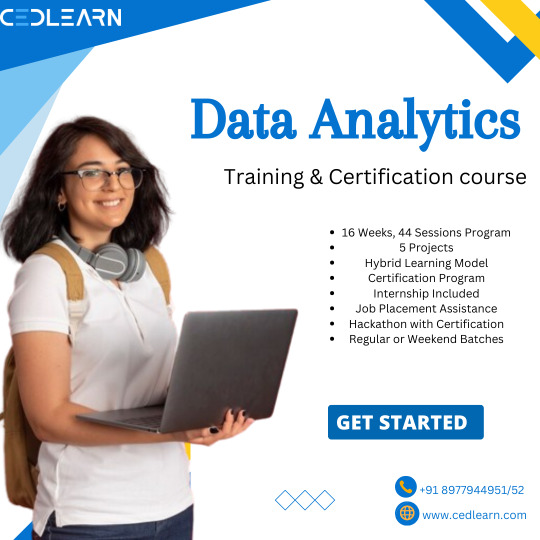Don't wanna be here? Send us removal request.
Text
Data Analytics Courses Training Institute | Learn Data Analytics Course | Data Analytics Certification Online
Data Analytics is the most popular field in any organization. For that matter, no managerial decisions are possible without analysing the data and extracting information from it. With the ever increasing volume of data organizations are interested in the insights the data could offer to make business decisions on a daily basis. Data Analytics uses various Statistical Models, Visualization Techniques, Software Applications or Tools, and finally expertise of the professional to generate required business reports.

Data Analytics has been around for ages. However, with the new tools, methods and prominence of Data Science, it has come into the limelight. With the ever-increasing volume of data and interest among the organization to extract information, there has been increasing demand for Data Analytics. Learn all the required tools and techniques with no coding.
0 notes
Text
Big Data Science Courses | Data Science Programs Online / Offline | Data Science Courses With Certificates
Data Science is part of the emerging technologies that are sought after by every industry, irrespective of its size and operations. Learn Data Science to analyse the data and create machine learning models for decision making. We at CEDLEARN believe in the project-based Hybrid Learning approach to convert knowledge into skills.

Course Title: Introduction to Data Science
Course Content:
Fundamentals of Data Science
Data Collection and Cleaning
Exploratory Data Analysis
Data Visualization Techniques
Introduction to Machine Learning
Introduction to Statistical Analysis
Introduction to Python or R Programming for Data Science
Benefits:
Provides foundational knowledge in data science concepts.
Equips learners with essential skills for data manipulation and analysis.
Introduces basic machine learning techniques.
Helps participants develop a structured approach to data analysis.
Uses:
Entry-level professionals seeking to transition into data-related roles.
Students exploring career paths in data science.
Professionals from non-technical backgrounds interested in understanding data analysis concepts.
0 notes
Text
Data Analytics Courses Training Institute | Data Analyst Online Courses | Data Analytics Certification Online
Data Analytics has been around for ages. However, with the new tools, methods and prominence of Data Science, it has come into the limelight. With the ever-increasing volume of data and interest among the organization to extract information, there has been increasing demand for Data Analytics. Learn all the required tools and techniques with no coding.

Informed Decision-Making: Data analytics enables professionals to analyze vast amounts of data to derive insights that drive informed decision-making. This skill is invaluable across sectors, from finance to healthcare, helping organizations optimize strategies and improve outcomes.
Business Intelligence: Understanding data analytics allows professionals to uncover patterns, trends, and correlations within data, providing valuable business intelligence. This insight helps businesses identify opportunities, predict market trends, and stay ahead of the competition.
Enhanced Efficiency and Productivity: By leveraging data analytics tools and techniques, individuals can streamline processes, automate tasks, and identify areas for improvement. This leads to enhanced efficiency and productivity within organizations, saving time and resources.
Personalization and Customer Insights: Data analytics empowers businesses to understand customer behavior, preferences, and needs on a granular level. This knowledge enables personalized marketing campaigns, product recommendations, and customer service, fostering stronger relationships and loyalty.
Risk Management: Analyzing data allows organizations to assess and mitigate risks effectively. By identifying potential threats and trends early on, businesses can proactively implement strategies to minimize risks and protect their interests.
Innovation and Growth: Data analytics fuels innovation by uncovering opportunities for optimization, new product development, and market expansion. Organizations that embrace data-driven decision-making are better positioned to innovate and adapt to changing market dynamics, driving sustainable growth.
Career Advancement: Proficiency in data analytics is highly sought after in today's job market. Completing a data analytics course equips individuals with valuable skills that can open doors to diverse career opportunities across industries, from data scientist to business analyst.
In summary, a data analytics course provides individuals with the knowledge and skills needed to extract actionable insights from data, leading to informed decision-making, enhanced efficiency, and strategic growth across various sectors.
0 notes
Text
data science trainig institute | Data Science Course With Placement | Data Science Certificate
Data science is a multidisciplinary field that uses scientific methods, algorithms, processes, and systems to extract insights and knowledge from structured and unstructured data. It encompasses various techniques from statistics, machine learning, data mining, and visualization to analyze and interpret complex data sets.

Content of Data Science:
Statistics: Understanding of statistical methods for data analysis, hypothesis testing, probability distributions, etc.
Machine Learning: Techniques and algorithms for building predictive models, such as regression, classification, clustering, and deep learning.
Data Mining: Extracting patterns and knowledge from large data sets using methods at the intersection of machine learning, statistics, and database systems.
Data Visualization: Presenting data in a graphical or visual format to facilitate understanding and interpretation.
Data Wrangling: Cleaning, transforming, and preparing raw data for analysis.
Big Data Technologies: Knowledge of tools and platforms for processing and analyzing large volumes of data efficiently, such as Hadoop, Spark, etc.
Domain Knowledge: Understanding of the specific domain or industry where data science is applied, such as finance, healthcare, marketing, etc.
Programming Skills: Proficiency in programming languages like Python, R, SQL, etc., and familiarity with relevant libraries and frameworks.
Uses and Benefits of Data Science:
Business Intelligence: Data science helps organizations gain valuable insights into their operations, customers, and market trends, enabling informed decision-making.
Predictive Analytics: By analyzing historical data, data science can forecast future trends and behaviors, allowing businesses to anticipate demand, optimize resources, and mitigate risks.
Personalization: Companies use data science to personalize products, services, and marketing campaigns based on individual preferences and behavior patterns.
Fraud Detection: Data science techniques are employed in detecting fraudulent activities, whether it's credit card fraud, insurance fraud, or identity theft.
Healthcare: Data science aids in analyzing patient data to improve diagnosis, treatment, and outcomes. It also helps in drug discovery and clinical trials.
Recommendation Systems: Data science powers recommendation engines in e-commerce platforms, streaming services, social media, etc., suggesting products, movies, music, or content based on user preferences.
Supply Chain Optimization: By analyzing supply chain data, organizations can optimize inventory management, logistics, and production processes, leading to cost savings and improved efficiency.
Risk Management: Data science assists in assessing and managing risks across various domains, including finance, insurance, and cybersecurity.
Social Impact: Data science is utilized in social initiatives like urban planning, disaster response, public health, and education to address societal challenges and improve the quality of life.
Overall, data science enables organizations to leverage data effectively to gain competitive advantages, drive innovation, and make data-driven decisions across various sectors and domains.
0 notes
Text
Best Data Science Course India | Learn Data Science Course | Data Science Certification Course
Data Science Course
DATA ANALYSIS AND MACHINE LEARNING TO EXTRACT INSIGHTS FROM THE DATA
Data Science is part of the emerging technologies that are sought after by every industry, irrespective of its size and operations. Learn Data Science to analyse the data and create machine learning models for decision making. We at CEDLEARN believe in the project-based Hybrid Learning approach to convert knowledge into skills.

Content: In today's data-driven world, harnessing the power of data science has become essential for businesses to thrive. From analyzing customer behavior to optimizing operational processes, data science offers a plethora of benefits across various industries. Let's delve into the world of data science, exploring its uses, benefits, and impact.
Understanding Data Science: Data science is an interdisciplinary field that employs scientific methods, algorithms, and systems to extract insights and knowledge from structured and unstructured data. It combines expertise from statistics, mathematics, computer science, and domain knowledge to uncover patterns, trends, and correlations within datasets.
Benefits of Data Science: a. Informed Decision Making: Data science empowers businesses to make informed decisions by providing actionable insights derived from data analysis. These insights help in understanding market trends, customer preferences, and competitor strategies. b. Predictive Analytics: By leveraging techniques like machine learning and predictive modeling, data science enables organizations to forecast future outcomes accurately. This capability aids in proactive decision-making and risk management. c. Enhanced Efficiency and Productivity: Through automation and optimization of processes, data science enhances efficiency and productivity within organizations. It streamlines workflows, identifies bottlenecks, and suggests improvements for resource allocation. d. Personalized Customer Experiences: Data science enables businesses to create personalized experiences for their customers by analyzing their preferences, behavior, and feedback. This personalized approach enhances customer satisfaction and loyalty. e. Fraud Detection and Security: Data science plays a crucial role in fraud detection and cybersecurity by identifying anomalous patterns and potential security breaches. It helps in safeguarding sensitive information and mitigating risks.
Uses of Data Science: a. Marketing and Sales: Data science aids in targeted marketing campaigns, customer segmentation, and sales forecasting, thereby maximizing ROI and revenue generation. b. Healthcare: In healthcare, data science facilitates disease diagnosis, treatment optimization, patient monitoring, and drug discovery, leading to improved patient outcomes and healthcare delivery. c. Finance: Data science is extensively used in financial institutions for risk assessment, fraud detection, algorithmic trading, and customer credit scoring, enhancing financial decision-making processes. d. Manufacturing: In manufacturing, data science optimizes production processes, predictive maintenance, quality control, and supply chain management, resulting in cost savings and operational efficiency. e. Transportation and Logistics: Data science improves route optimization, demand forecasting, fleet management, and inventory optimization, leading to smoother logistics operations and reduced costs.
In conclusion, data science revolutionizes how businesses operate and make decisions in the modern era. Its myriad benefits and diverse applications underscore its significance across industries. Embracing data science not only fosters innovation and growth but also gives organizations a competitive edge in today's dynamic marketplace.
0 notes
Text
Data Analytics Courses Training Institute | Data Analytics Courses | Data Analytics Certification Online
Data Analytics Course
STATISTICAL MODELLING, TOOLS AND VISUALIZATION TO EXTRACT INFORMATION FROM DA
cedlearn Data Analytics has been around for ages. However, with the new tools, methods and prominence of Data Science, it has come into the limelight. With the ever-increasing volume of data and interest among the organization to extract information, there has been increasing demand for Data Analytics. Learn all the required tools and techniques with no coding.

Course Content:
Introduction to Data Analytics:
Understanding the basics of data analytics.
Different types of data (structured, unstructured, semi-structured).
Introduction to tools and technologies used in data analytics (e.g., Python, R, SQL, Excel).
Data Collection and Cleaning:
Methods for collecting data from various sources (databases, APIs, web scraping).
Data cleaning techniques to handle missing values, outliers, and inconsistencies.
Data Exploration and Visualization:
Exploratory data analysis (EDA) techniques.
Visualization tools and libraries (e.g., Matplotlib, Seaborn, Tableau).
Creating meaningful visualizations to uncover patterns and trends in data.
Statistical Analysis:
Basic statistical concepts (mean, median, mode, standard deviation, etc.).
Hypothesis testing and confidence intervals.
Regression analysis and correlation.
Machine Learning Basics:
Introduction to machine learning algorithms (supervised, unsupervised, and reinforcement learning).
Model evaluation and validation techniques.
Feature engineering and selection.
Benefits and Uses:
Informed Decision Making:
Data analytics helps organizations make informed decisions based on data-driven insights rather than intuition or guesswork.
Improved Efficiency:
By analyzing data, organizations can identify inefficiencies in processes and optimize resource allocation for better efficiency.
Competitive Advantage:
Companies that effectively utilize data analytics gain a competitive edge by identifying market trends, customer preferences, and areas for innovation.
Better Targeting and Personalization:
Data analytics enables businesses to target the right audience with personalized marketing campaigns, leading to higher conversion rates and customer satisfaction.
Risk Management:
Analyzing historical data helps organizations identify potential risks and develop strategies to mitigate them, whether it's financial risks, operational risks, or cybersecurity threats.
nformed Decision Making: Data analytics provides the foundation for making informed decisions based on evidence rather than intuition. By analyzing data, organizations can identify trends, patterns, and insights that inform strategic decisions.
Competitive Advantage: In today's data-driven world, organizations that leverage data analytics effectively gain a competitive edge. By understanding customer behavior, market trends, and operational efficiencies, businesses can outperform competitors and adapt to changing market conditions more swiftly.
Improved Efficiency: Data analytics enables organizations to streamline processes, optimize resource allocation, and identify areas for improvement. By analyzing operational data, companies can eliminate bottlenecks, reduce waste, and enhance productivity.
Risk Management: Data analytics plays a crucial role in identifying and mitigating risks across various domains. Whether it's financial risks, operational risks, or cybersecurity threats, analyzing data allows organizations to proactively manage risks and prevent potential disruptions.
Enhanced Customer Experience: By analyzing customer data, organizations can gain insights into customer preferences, behaviors, and satisfaction levels. This information allows companies to tailor products, services, and marketing strategies to meet the needs of their target audience more effectively, leading to improved customer experiences and loyalty.
#data analytics training institute#data analytics certificate course#data analytics course online#best data analytics course
0 notes
Text
Best Azure Devops Course in hyderabad | Learn AWS Devops | Aws Azure Devops Certification Course

Azure/AWS DevOps Course LEARN TO DESIGN, DEPLOY MANAGE AND MONITOR CLOUD-BASED APPLICATIONS AND GET PLACED.
As a DevOps Engineer you are responsible for bridging the gap between the development and operations team ensuring smooth IT operations. Work with teams to enhance collaboration automate processes, deploy and manage code modifications to improve the overall efficiency of the software development lifecycle.
Course Content:
Introduction to DevOps:
Understanding DevOps principles and practices.
Exploring the benefits of DevOps in modern software development.
Introduction to AWS and Azure:
Overview of AWS services relevant to DevOps (e.g., AWS CodePipeline, AWS CodeBuild, AWS CodeDeploy).
Overview of Azure services relevant to DevOps (e.g., Azure DevOps, Azure Pipelines, Azure Boards).
Setting up Environments:
Creating and configuring development, testing, and production environments on AWS and Azure.
Understanding infrastructure as code (IaC) concepts using tools like AWS CloudFormation and Azure Resource Manager (ARM) templates.
Version Control:
Utilizing version control systems like Git.
Integrating Git repositories with AWS CodeCommit and Azure Repos.
Continuous Integration (CI):
Setting up CI pipelines using AWS CodePipeline and Azure Pipelines.
Configuring build tasks with AWS CodeBuild and Azure Pipelines.
Benefits and Uses:
Improved Efficiency: DevOps practices enable faster development cycles, quicker deployment, and better collaboration between development and operations teams.
Scalability: Leveraging AWS and Azure services allows for scaling infrastructure resources based on demand, ensuring optimal performance and cost-effectiveness.
Reliability: Implementing CI/CD pipelines and robust monitoring helps maintain system reliability and uptime.
Cost Optimization: Optimizing resource usage and automating processes can lead to significant cost savings in the long run.
Enhanced Security: Implementing security best practices and compliance standards ensures data protection and regulatory compliance.
Innovation: DevOps methodologies encourage experimentation and innovation by streamlining development processes and enabling rapid feedback loops.
Key Points:
Hybrid Cloud Environment: Learning to work with both AWS and Azure prepares professionals to operate in hybrid cloud environments, which are increasingly common in enterprise settings.
Automation: Emphasizing automation reduces manual intervention, minimizes errors, and accelerates time-to-market for applications.
Cross-Platform Skills: Acquiring skills in both AWS and Azure makes professionals versatile and adaptable to different cloud platforms and technologies.
Continuous Learning: DevOps is an evolving field, so staying updated with the latest tools and practices is crucial for long-term success in this role.
Overall, a course in AWS Azure DevOps equips professionals with the skills and knowledge needed to leverage cloud computing platforms effectively while implementing DevOps practices to deliver high-quality software solutions efficiently.
0 notes
Text
Aws Azure DevOps Training Institute | Best Azure Devops Course | Devops Azure Certificationin madhapur
Azure/AWS DevOps Course
LEARN TO DESIGN, DEPLOY MANAGE AND MONITOR CLOUD-BASED APPLICATIONS AND GET PLACED.
cedlearn As a DevOps Engineer you are responsible for bridging the gap between the development and operations team ensuring smooth IT operations. Work with teams to enhance collaboration automate processes, deploy and manage code modifications to improve the overall efficiency of the software development lifecycle.

cedlearn In-Demand Skills: DevOps is a highly sought-after skillset in the IT industry. Learning AWS/Azure DevOps can open up various job opportunities and increase your marketability.
Cloud Computing Mastery: AWS and Azure are leading cloud platforms used by businesses worldwide. Understanding DevOps principles in these environments allows you to effectively manage cloud infrastructure and applications.
Efficiency and Collaboration: DevOps practices emphasize automation, collaboration, and continuous integration/continuous delivery (CI/CD). By mastering DevOps on AWS/Azure, you can streamline development processes and improve team collaboration.
Scalability and Flexibility: Cloud environments offer scalability and flexibility, allowing businesses to adapt quickly to changing demands. DevOps on AWS/Azure teaches you how to leverage these capabilities effectively.
Cost Optimization: DevOps practices help optimize costs by reducing manual tasks, improving resource utilization, and enhancing overall efficiency in cloud environments.
WHYAzure/AWS DevOps Course ?
The current course on Azure/AWS DevOps is aimed to develop professional with right skills to deploy and manage cloud application with ease. This skill-based project-oriented course would offer right exposure and knowledge to land in your dream career. Learners are expected to showcase their learning through projects. Post-program, with right profile building you would be the sought-after professional in the market.
0 notes
Text
DATA SCIENCE COURSE | DATA SCIENCE TRANING INSTITUTE | BEST DATA SCIENCE COURSE
Data Science is part of the emerging technologies that are sought after by every industry, irrespective of its size and operations. Learn Data Science to analyse the data and create machine learning models for decision making. We at CEDLEARN believe in the project-based Hybrid Learning approach to convert knowledge into skills.
DATA SCIENCE?
It is strange but true. Data Science is a combination of art and science. It involves extraction and analysis of relevant data from various sources. It also helps in finding the domain specific solution for the business problem. Data Science is a combination of Data Analytics and Machine Learning techniques to develop decision making models for business decisions. Data Analytics that deals with structuring and analyzing raw data to create insights and make conclusions which is core for the Data science.
Anybody can learn Data Science, from tech and non-tech background, with right guidance and methodology. Data Science is applicable and widely used in every business domain. With the ever increasing volume and versatility of the data and the complexity involved in it, market is constantly looking for the talent that could provide predicative models for decision making. The profession is in high demand now as most businesses heavily rely on data science. It is right time to invest in learning Data Science for better future.

0 notes
Text
Best Data Analytics Training Institute In Hyderabad | best data analytics courses in india with placements | Learn Data Analytics Course

DATA ANALYTICS Data Analytics has been around for ages. However, with the new tools, methods and prominence of Data Science, it has come into the limelight. With the ever-increasing volume of data and interest among the organization to extract information, there has been increasing demand for Data Analytics. Learn all the required tools and techniques with no coding.
Data Analytics is the most popular field in any organization. For that matter, no managerial decisions are possible without analysing the data and extracting information from it. With the ever increasing volume of data organizations are interested in the insights the data could offer to make business decisions on a daily basis. Data Analytics uses various Statistical Models, Visualization Techniques, Software Applications or Tools, and finally expertise of the professional to generate required business reports.
#data analytics training institute#data analytics certificate course#data analytics course#data analytics course with placments
0 notes
Text
Data Analytics course | data Analytics Traning Institute | Best Data Analytics Course in Hyderabad
The best part of the Data Analytics course is that there is no coding involved. Considering the role and the operations involved we could say that even the professionals from non-technical educational backgrounds could learn Data Analytics. Hence it is widely recommended for those who would like to step into the world of Data Science to start with Data Analytics. Business Intelligence and Dashboarding are popular among the industries are in high demand. Sometimes, you do not need to build machine learning models to get the required information from the data, hence the popularity of Data Analytics

0 notes
Text
Microsoft DevOps Certification | Azure DevOps Training near me | Azure DevOps Certification Training
CEDLEARN is recognized for providing Realtime Azure Devops Training in Hyderabad and Azure Devops Online Training throughout world.
CEDLEARN is one of the best software training institute in Hyderabad Azure Devops is the cloud based Devops dashboard and provided by Microsoft.
AWS DevOps, or Amazon Web Services DevOps, refers to the practice of combining development and operations processes using the services and tools provided by Amazon Web Services (AWS). DevOps aims to streamline the software development lifecycle by fostering collaboration and communication between development and operations teams. AWS, as a cloud computing platform, offers a variety of services that can be leveraged to implement and support DevOps practices.
0 notes
Photo

Data Analytics is the most popular field in any organization. For that matter, no managerial decisions are possible without analyzing the data and extracting information from it. With the ever increasing volume of data organizations are interested in the insights the data could offer to make business decisions on a daily basis. Data Analytics uses various Statistical Models, Visualization Techniques, Software Applications or Tools, and finally expertise of the professional to generate required business reports.
The best part of the Data Analytics course is that there is no coding involved. Considering the role and the operations involved we could say that even the professionals from non-technical educational backgrounds could learn Data Analytics. Hence it is widely recommended for those who would like to step into the world of Data Science to start with Data Analytics. Business Intelligence and Dashboarding are popular among the industries are in high demand. Sometimes, you do not need to build machine learning models to get the required information from the data, hence the popularity of Data Analytics.
1 note
·
View note
Text
Best Data Analytics Training Institute in Chennai
Data Analytics Data analytics is the process of examining large sets of data to uncover insights, trends, and patterns that can be used to make informed business decisions. This involves the use of various techniques and tools to analyse, manipulate, and visualize data in a way that makes it easier to understand and draw conclusions from. In this guide, we will cover the key steps involved in the data analytics process.
1. Define the problem or question The first step in data analytics is to clearly define the problem or question you want to answer. This could be anything from identifying customer buying patterns to optimizing supply chain logistics. By defining the problem, you can then determine what data you need to collect and analyse to answer it.
2 Collect and clean the data Once you have defined the problem, the next step is to collect and clean the data. This involves gathering relevant data from various sources, such as databases, spreadsheets, or APIs, and ensuring that it is accurate, complete, and consistent. Data cleaning also involves removing any duplicate, irrelevant, or inaccurate data to ensure that the analysis is based on high-quality data.
3. Analyse the data After the data has been collected and cleaned, the next step is to analyse it. This involves using various statistical and machine learning techniques to identify patterns, correlations, and trends in the data. Common techniques used in data analysis include regression analysis, clustering, and classification.
4. Visualize the data Data visualization is an important part of the data analytics process as it helps to communicate insights in a clear and concise way. By using charts, graphs, and other visualizations, you can make it easier for stakeholders to understand the data and draw meaningful conclusions from it.
5. Draw conclusions and make decisions The final step in data analytics is to draw conclusions from the analysis and use those insights to make informed business decisions. By using the insights gained from the data analysis, you can identify areas for improvement, optimize processes, and make better-informed decisions that are grounded in data.
Data analytics is a powerful tool that can help businesses make informed decisions based on high-quality data. By following the steps outlined in this guide, you can effectively analyse and visualize data to uncover insights that can drive business success

There are several types of data analytics:
1. Descriptive Analytics: It involves analysing historical data to gain insights into past events and trends. It is used to understand what happened and why it happened.
2. Diagnostic Analytics: It involves analysing data to understand why certain events or patterns occurred. It helps in identifying the root cause of a problem.
3. Predictive Analytics: It involves using statistical models and machine learning algorithms to make predictions about future events or trends. It helps in identifying potential opportunities or risks.
4. Prescriptive Analytics: It involves using data, algorithms, and optimization techniques to recommend specific actions or solutions. It helps in making informed decisions and optimizing business processes.
5. Text Analytics: It involves analysing unstructured text data, such as emails, social media posts, and customer reviews, to extract insights and sentiment analysis.
6. Web Analytics: It involves analysing website traffic and user behaviour to optimize website performance and user experience.
7. Business Analytics: It involves using data to optimize business processes and improve performance across various departments, such as marketing, finance, and operations.
Applications of Data Analytics
Data analytics refers to the process of examining and interpreting large and complex data sets to extract meaningful insights and information. This involves using a variety of statistical and computational techniques to analyze data, identify patterns, and make informed decisions based on the results.
Data analytics has a wide range of applications in various industries, including:
1. Business: Data analytics can be used to analyse customer behavior, market trends, and financial data to help businesses make informed decisions and improve their performance.
2. Healthcare: Data analytics can be used to analyse patient data to identify patterns, diagnose diseases, and develop personalized treatment plans.
3. Finance: Data analytics can be used to analyze financial data and detect fraud, as well as to forecast market trends and make investment decisions.
4. Sports: Data analytics can be used to analyze player performance, predict game outcomes, and develop game strategies.
5. Government: Data analytics can be used to analyze crime data, monitor public health trends, and improve public policy decisions.
Overall, data analytics plays a crucial role in helping organizations of all types and sizes make better decisions, improve performance, and stay ahead of the competition.
#data#data analyticscourse#data analytics course in chennai#data analytics#data anaalytics training#data analytics training institute#data analytics training institute in chennai
1 note
·
View note
Photo

Cedlearn offers the best Data Analytics certification courses in Hyderabad. The training program equips you with an apt understanding of data processing tools like Excel, Power BI, and My SQL, and Data Visualization tools like Tableau and PowerBI. While SQL/NoSQL is utilized to work with the information put away in the Data set Administration programming, Scene and PowerBI are utilized in breaking down it and introducing visual stories to end clients. Ideas, for example, Information Arrangement, Information Purging, and Exploratory Information Examination are investigated exhaustively. Progressed Succeed supports information capability Ideas and it will assist with diminishing and lessening working hours.
The course is planned to remember all the most recent market patterns and it targets furnishing you with every one of the instruments and strategies to deal with enormous informational collections through Information Investigation. Course members will get to evaluate the utilization of these advances that are utilized in putting away and handling gigantic measures of information. Every module is strongly intended to cover every one of the significant ideas and to break down organized and unstructured information, building visual stories utilizing Scene as well as PowerBI abilities. Proficient Information Examination Course is great for experts who need to secure top to bottom information on everyday utilized Information systems. The three-month Information Examination preparation will cover fundamental instruments like SQL, NoSQL, Scene, PowerBI, and Progressed Succeed ideas. Understudies will figure out how to store, recover, control, and break down enormous datasets put away in Data set administration frameworks like social data set administration frameworks or archive-based data set frameworks. The course contains different applied contextual analyses that empower the members to take care of complicated business issues further developing productivity in their organizations.
#Data Analytics Course Training in Bangalore#Data Analytics Course Training in Chennai#Data Science Course Training in Delhi#Data Science Course Training in Hyderabad
1 note
·
View note
Photo

Data Science is a combination of art and science. It involves extraction and analysis of relevant data from various sources. It also helps in finding the domain specific solution for the business problem. Data Science is a combination of Data Analytics and Machine Learning techniques to develop decision making models for business decisions. Data Analytics that deals with structuring and analysing raw data to create insights and make conclusions which is core for the Data science.
1 note
·
View note
Photo

Data Science is a combination of art and science. It involves extraction and analysis of relevant data from various sources. It also helps in finding the domain specific solution for the business problem. Data Science is a combination of Data Analytics and Machine Learning techniques to develop decision making models for business decisions. Data Analytics that deals with structuring and analyzing raw data to create insights and make conclusions which is core for the Data science.
1 note
·
View note